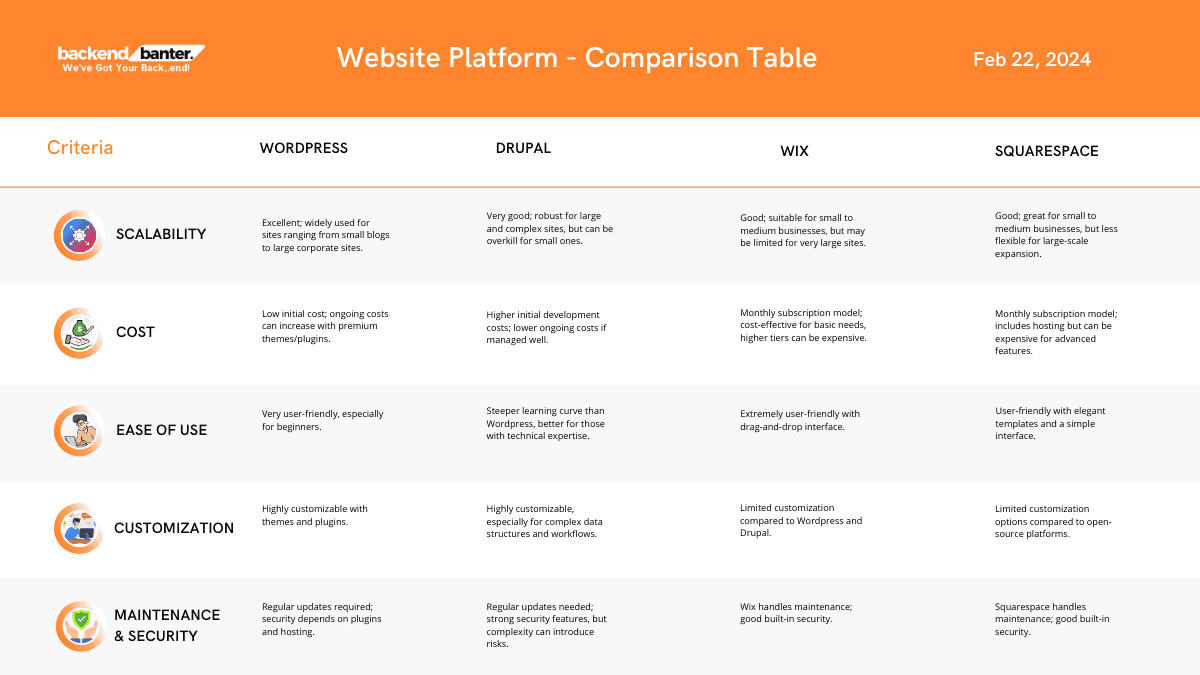Introduction
Choosing the right website platform is a critical decision for anyone looking to establish an online presence. Whether for a personal blog, a portfolio, or an e-commerce store, the platform you select forms the foundation of your digital identity. It’s essential to consider your specific needs and goals. For a budding entrepreneur, an online shop with e-commerce capabilities might be vital. In contrast, an artist or writer may prioritize aesthetics and simplicity to showcase their work.

When exploring different website platforms, it’s important to pay attention to design options and templates available. A platform that offers an array of aesthetically pleasing and customisable templates can greatly enhance the user’s experience. Moreover, functionality should not be overlooked; the platform should offer the necessary tools for the website to operate efficiently and meet the growing demands of its audience. Beyond the visual appeal and functional features, a good website platform should be technically sound, offering solid SEO features to make sure your site is discoverable, as well as offering appropriate support and resources to assist you as you build and grow your online presence.
Key Takeaways
- Selecting the right website platform requires careful consideration of individual website goals and needs.
- A good platform should offer a diverse array of design options and customizable functionality.
- Technical capabilities, SEO tools, and support resources are vital for long-term website growth and visibility.
Evaluating Your Needs

Before selecting a website platform, one must conduct a thorough assessment of their specific needs and market. This process will ensure the choice facilitates achieving set goals, whether for individuals or small businesses.
Understanding Your Market
One should begin by analyzing the target market, which involves researching the demographics, preferences, and online behaviors of the intended audience. For individuals, this could mean determining the platforms where personal content is most likely to be engaged with. Small businesses need a broader approach, ensuring their platform of choice can handle varying customer interactions and transactions suitable for their industry.
Identifying Specific Goals
Next, it’s essential to outline clear and measurable goals. For individuals, goals might include portfolio display or personal blogging. In contrast, small businesses should consider goals like e-commerce sales, lead generation, or customer support. Identifying these goals helps in prioritizing features such as security, scalability, and customization options of a website platform. It guides one in choosing a robust platform that aligns with the strategic objectives of their online presence.
Exploring Different Platforms

When selecting a website platform, it’s crucial to consider not only the popularity of the platform but also its specific features and limitations. This assessment helps in making an informed decision that aligns with one’s business needs and technical proficiency.
Popular Choices: Pros and Cons
- WordPress:
- Pros: Versatile and open-source with a vast library of plugins and themes.
- Cons: Requires regular maintenance and some technical knowledge for complex functions.
- Wix:
- Pros: User-friendly interface, drag-and-drop features, good for beginners.
- Cons: Less control over site’s technical aspects, can be restrictive for advanced users.
- Squarespace:
- Pros: Sleek templates, all-in-one solution, good for designers and artists.
- Cons: Limited third-party apps and customization options.
- Shopify:
- Pros: E-commerce centric, secure and reliable platform with strong sales tools.
- Cons: Monthly fee can be high, less suitable for content-centric sites.
- Weebly:
- Pros: Intuitive design options and reasonable pricing.
- Cons: Limited built-in features and integrations.
- BigCommerce:
- Pros: Scalable for large stores, strong SEO features.
- Cons: Can be complex for beginners, higher cost for high volume stores.
You May Also Like: Master Wix Website Basics For Your Online Success
Comparing Features and Limitations
WordPress offers extensive customization capabilities which are advantageous for those needing a unique or content-rich website. However, navigating its plugins and themes may require a steeper learning curve.
Wix and Weebly stand out as website builders with their user-friendly platforms making them accessible for beginners, but potentially limiting for those requiring advanced features.
Squarespace caters to those looking for visually appealing designs without the hassle of coding, yet its limitations in terms of external applications may hinder some businesses.
Shopify and BigCommerce are robust e-commerce platforms with powerful tools to manage online stores, yet the cost and complexity could be prohibitive for smaller operations or those less focused on sales.
By comparing these platforms, one can weigh website builders on the merits of their pros and cons, and select one that best suits their technical skills, business model, and desired website functionality.
View our comparison table which evaluates the pros and cons of the website platforms we recommend for SMBs below.

Design and Templates

When selecting a website platform, one must consider the design and template options available. These elements are crucial in ensuring the website not only looks professional, but also caters effectively to user experience and accessibility demands.
Choosing the Right Theme
Selecting the right theme is pivotal for conveying a website’s brand and purpose. One should look for a theme that aligns with their industry and personal aesthetic, but also pay attention to the possibilities for customization. Design flexibility within a theme allows for tailoring to specific needs, such as color schemes, font choices, and layout structures. For instance, a theme that incorporates a variety of pre-designed templates can hasten the development process, like the functionality offered by platforms detailed in studies on template engines technology.
Responsiveness and Mobile-Friendly Design
With a significant portion of web traffic coming from mobile devices, a responsive design is non-negotiable. A theme must automatically adjust to different screen sizes offering consistent usability. Mobile-friendly designs are a ranking factor for search engines and improve the likelihood of customer conversion. For an effective implementation of e-commerce functionality in this area, one might consider the power of platforms such as SPHERE.IO, which support responsive design elements.
You May Also Like: Kadence WP Review (Best WordPress Theme ….. In our opinion)
Functionality and Customization

When choosing a website platform, one must consider the specific functional needs of their business. These needs often hinge on two critical aspects: e-commerce capabilities for online transaction handling, and the availability of plugins and extensions for enhanced functionality and customization options.
E-commerce Capabilities
A platform’s e-commerce capabilities are fundamental for businesses that require online sales transactions. Key features to look for include:
- Shopping cart functionality
- Secure payment gateway integration
- Inventory management
- Sales tax and shipping options
Platforms like Shopify and Magento offer comprehensive e-commerce solutions that provide a blend of these functionalities. For simpler needs, platforms with modular e-commerce capabilities such as WordPress with WooCommerce might be suitable.
You May Also Like: Ultimate Guide To WordPress eCommerce For Caribbean Businesses
Plugins and Extensions
For functionality beyond the core capabilities of a website platform, one must evaluate the availability and quality of plugins and extensions. These can range from SEO tools to social media integration. Ease of use is also pertinent; many users prefer a platform with a drag-and-drop interface, making customization more accessible without extensive technical know-how.
Key considerations for plugins and extensions include:
- Range and purpose: Ensure there is a wide selection that serves your specific business needs.
- Support and updates: Check if plugins are well-supported and regularly updated by developers.
Platforms like WordPress are renowned for their extensive plugins library, while others might offer more specialized extensions tailored to unique business models.
Technical Aspects

Choosing the right website platform requires careful consideration of its technical framework. The platform’s capability to effectively manage domain and hosting as well as its strength in security and maintenance are crucial for the stability and accessibility of a website.
Domain and Hosting
A website’s domain acts as its unique address on the internet, while hosting provides the necessary infrastructure to store website content. When selecting a website platform, it’s important to check if it offers domain registration services or if the user needs to purchase it separately. Reliability is key, so one should opt for hosting services that ensure high uptime and offer scalable solutions to accommodate growth. The right platform should allow for seamless integration of both domain and hosting for a smooth online presence.
Security and Maintenance
Robust security protocols, such as implementation of SSL certificates, safeguard a website’s data integrity and user privacy. A reputable website platform should provide automatic SSL certification for websites to establish secure connections. In terms of maintenance, regular updates are vital to protect against vulnerabilities. A platform must deliver consistent updates to its infrastructure and software to defend against the latest cyber threats. Additionally, it should offer tools for website owners to easily manage these updates.
SEO and Marketing Tools

Selecting a website platform that supports strong SEO and marketing capabilities is crucial for visibility and engagement. Integrating robust SEO features and leveraging social media and email marketing can significantly influence a website’s success.
Incorporating SEO Features
A platform should facilitate optimal SEO performance. This includes the ability to customize page titles, meta descriptions, and URLs to enhance searchability. Incorporating Google Analytics is essential for tracking website traffic and gauging the effectiveness of SEO strategies. Websites benefit from platforms that easily integrate with SEO tools designed to improve site ranking on search engines.
- Key SEO components the platform should support:
- Customizable meta tags (titles, descriptions)
- Search-friendly URLs
- Fast page loading speeds
- Mobile optimization
Utilizing Social Media and Email Marketing
Effective platforms offer integrations with social media tools to streamline promotional activities across various channels. They should also include or work seamlessly with email marketing software, enabling website owners to create and execute email campaigns that maintain engagement and foster customer loyalty.
- Crucial marketing tools for integration:
- Social media scheduling and analytics
- Email list management
- Newsletter campaign automation
- Performance tracking and insights
Businesses should seek platforms that provide easy access to these marketing tools, facilitating a cohesive and efficient marketing strategy.
Support and Resources

Choosing a website platform entails considering the level of support and resources available. Prospective users should evaluate both the customer support services and the available learning resources with community engagement. This will ensure a smoother user experience and access to helpful information that can facilitate the website’s deployment and management.
Customer Support Services
Customer support is a pivotal element that can greatly influence the success of a website. Immediate and efficient customer support services ensure that technical issues and queries are addressed promptly, reducing downtime and frustration. Availability via multiple channels such as email, live chat, and phone is essential. For instance, platforms that offer 24/7 support have an edge in delivering timely assistance to their global user base.
Learning Resources and Community
The learning curve associated with a new platform is mitigated by comprehensive learning resources. These resources might include detailed documentation, how-to guides, video tutorials, and FAQs. A robust community of users contributes to a wealth of community resources, such as forums and discussion boards, where one can find peer support and shared knowledge. Engaging with the community can also lead to discovering best practices and innovative uses of the platform.
Cost Analysis

Choosing the right website platform often comes down to cost considerations. It is essential to examine both immediate pricing and long-term financial impact to make an informed decision.
Understanding Pricing Plans
Pricing plans for website platforms can vary widely. They typically offer a range of options from basic functionalities to premium features. When examining these plans, one should look at the inclusions – such as domain registration, SSL certificates, and access to customer support – and compare them against the needs of their website. For example, platforms often have differing approaches when it comes to charging for additional features, which must be considered against the specific requirements of the user or business.
Evaluating Long-Term Costs
When it comes to long-term costs, it’s not just about the ongoing subscription fees. Consider the total cost of ownership, which includes maintenance, scalability and likely upgrades over time. For instance, cloud computing platforms might offer low initial costs, but one should assess the long-term costs associated with data storage and scalability. Additionally, the long-term value can be influenced by the ease with which one can adapt the platform to changing business needs, the quality of customer service, and the frequency of mandatory updates or overhauls.
Frequently Asked Questions

When choosing a website platform, it’s crucial to consider your skill level, the platform’s flexibility, and any specific features you may need for your site.
What should I look for when selecting a platform for building my website?
One should assess the platform’s ease of use, customization options, scalability, and support. It’s also important to evaluate the integration capabilities with third-party tools and services.
What are the advantages of using a website builder for a beginner?
Website builders offer beginners a user-friendly interface and drag-and-drop functionality, making it easier to create and launch a website without coding knowledge.
Which website platform is the best for creating an online store?
A platform that specializes in e-commerce, such as Shopify or WooCommerce, is typically best for an online store. They provide robust tools tailored for managing products, inventory, and payments.
How do I determine the right website builder for my specific needs?
Consider the builder’s templates, design flexibility, SEO tools, and whether it has features specific to your industry. Analyzing the trade-offs between cost and functionality is also key.
What criteria should guide me in choosing a website builder software?
Key criteria include the cost, the level of technical support, security features, mobile responsiveness, and built-in SEO capabilities.
Can I create a professional-looking website using a free website builder?
Yes, many free website builders offer a range of templates and design tools that can help create a professional-looking website. However, customization and functionality may be limited compared to paid options.


